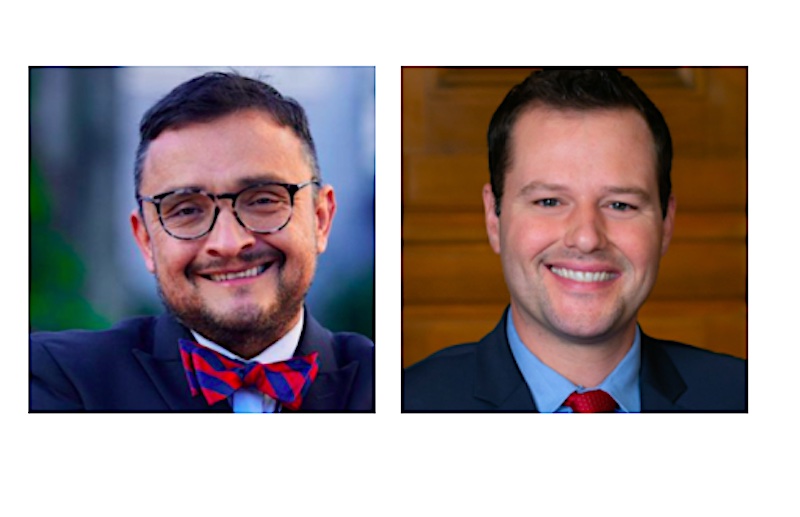We are starting to see the money coming into the San Francisco Assembly race, and it shows some significant patterns.
The actual forms that disclose all of the candidate spending aren’t available yet, but the Secretary of State’s Office requires disclosure of late and major (more than $5,000) contributions, so we can see enough to draw some conclusions.

The most obvious: There’s a very big-money independent-expenditure committee supporting Sup. Matt Haney, with money coming from the building-trades unions but also from Big Tech guy Chris Larsen and from the California Dental Association, which opposes the single-payer healthcare bill that’s now in the State Assembly.
Haney also got a direct contribution of $4,900 from the California Medical Association, which has historically opposed single-payer.
Haney told me he is a strong supporter of AB 1400, and the bill’s author, Ash Kalra, has endorsed him, and will be at a rally for him January 29.
There is so far no registered IE supporting Campos. The filings so far show that his larger donations are from the teacher’s union (locally and statewide), two Native American tribes, and the campaigns of members of the Latino Caucus of the state Legislature, which has endorsed him.
So let’s break this down.
There are, I have concluded after 40 years in this business, three basic reasons individuals, businesses, and institutions donate to political candidates.
Reason one is simple: People give money, usually smaller amounts, to candidates who they believe agree with them on the issues and who they think will do a good job representing their interests. Both Haney and Campos have a lot of those donors.
Reason two is a bit more transactional: Lobbyists and corporate interests give money so that candidates will take their phone calls and meet with them. That money, in larger amounts, buys access; a lobbyist for PG&E gives you a maximum contribution, and when that person wants to talk to you about an energy bill, you are expected to listen to them. It doesn’t mean you will always vote their way, but it means they get a chance to make their pitch.
The third reason—and the reason that huge money goes into IEs—is that big-money interests believe that it’s better for them if one candidate is elected than another.
When an individual or union or corporation or lobbying group puts upwards of $10,000 into a campaign (and that’s an IE campaign, where there are no limits) it means that outfit thinks the race is important—and that one candidate will be better for them.
So why did the California Dental Association give $45,000 to an IE supporting Haney (which will almost certainly spend much its money attacking Campos)?
Why does a lobbying group for dentists care about a San Francisco Assembly race enough to put up that kind of money?
Why did unions representing the building trades, along with the United Food and Commercial Workers, put almost $200,000 of their members money into the Haney IE?
Why did Chris Larsen, CEO of Ripple, who has been a part of past efforts to keep progressives from getting elected to local office, put $25,000 into the IE?
That isn’t phone-call or meeting money. That’s money that says donors think Haney would be better than Campos on issues that they really, really care about.
It’s no secret that Haney publicly supports the single-payer bill. So does Campos. Haney told me that he was very clear with the CMA and the dentists that he is a backer of AB 1400. Campos told me he said the same thing to the same groups.
In the end, the opponents of single-payer went with Haney, with some big money.
The building trades unions, among other things, want more development that will keep their members employed. Campos has in the past said that sometimes, development leads to gentrification and displacement; Haney has been more supportive of market-rate housing.
Chris Larsen clearly thinks that Haney would be more likely than Campos to work with him on issues he cares about (and in the past, that has included defeating progressives for local office, although Larsen is now opposing the Chesa Boudin recall).
The teachers’ unions clearly think Campos would be better on issues that impact their members. The tribes are at this point fairly minor players, but they clearly think that Campos will be with them on issues involving their sovereign rights to operating gambling casinos on tribal lands.
The members of the Latino Caucus want Campos to join them in Sacramento.
Haney told me that Campos “took a bunch of cash from AT&T, card rooms, and big health care company executives.” I found one direct donation of $2,000 from an AT&T vice president who Campos told me he has know for years. He also had one donation of $2,000 from Warren Browner, who is the CEO of California Pacific Medical Center.
Haney told me “I don’t know anything about any IEs.”
Both candidates have agreed to a spending cap of $649,000. Both will wind up raising that amount, in donations of $4,900 or less. The big outside money will be in the IEs, and at this point, that’s all Haney.
You can learn a lot from the money trail—not about what the candidates say or what their positions are on the issues, but from who the big money groups think would be better for them.



